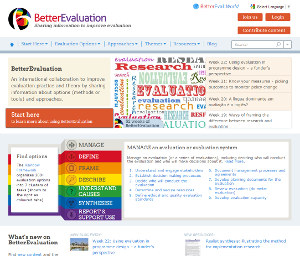Single hub for project success reports high numbers
 As the fickle cycles of politics appear to give with one hand while taking with the other, it is difficult to tell which programs actually work.
As the fickle cycles of politics appear to give with one hand while taking with the other, it is difficult to tell which programs actually work.
But a four-year research project is making it a bit easier to evaluate the real effectiveness of government and non-government projects.
A team of researchers from RMIT's Centre for Applied Social Research has put together a new online resource to compile tools that were scattered across websites, unpublished reports, and personal undocumented knowledge.
The result is BetterEvaluation.
The site provides access to information about more than 200 different evaluation methods and processes through its website, webinars and live activities.
Structured around a rainbow list of evaluation tasks, it helps users to choose the methods or processes they need and how to use them most effectively.
Administrators say the site accessed by more than 10,000 users worldwide each week and is supported by more than 2,000 individual registered members.
Project director, Professor Patricia Rogers, said the project documented the collective wisdom of people doing evaluation in different sectors, organisations, regions and languages.
The BetterEvaluation team has also helped in the development of an Evaluation Toolkit for the NSW Government, guidance on impact evaluation for UNICEF program managers and the South African Government, and advice on developing terms of reference for USAID program managers.
Dr Rodgers says part of the plan is to increase the standard of checvs.
“Simple input-output-impact factory-line models no longer fit how programs work,” Rogers says.
“We need evaluation methods that can encompass complicated programs with multiple contributors, multiple levels and multiple causal pathways.
“And we need methods that can encompass complex programs which are inherently emergent and changing, where traditional methods of planning need to be replaced by more real-time learning and adaptation.”
The project has received financial support from Australia's Department of Foreign Affairs and Trade, as well as a number of international backers.
“A number of DFAT staff helped to trial and test the website and ensure that it is user-friendly and meets their needs. We have enjoyed working with RMIT on the BetterEvaluation partnership,” a spokesperson for the Department of Foreign Affairs and Trade said.
“BetterEvaluation has been flexible and responsive and our cooperative work has included a small project with the Indonesian Development Evaluation Community, developing local language evaluation resources and case studies. We look forward to our ongoing partnership.”







 Print
Print